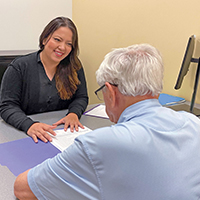twoColumn twoRight
UNF’S Largest Competitive Grant to Fund Alzheimer's Research

The overall $44.4 million grant from the NIH’s National Institute on Aging will be distributed among the participating universities. UNF’s portion of the grant, $5 million expected over five years, represents the largest competitive grant in the University’s history and was awarded to Dr. Jody Nicholson, associate professor of psychology, who will lead the UNF-PACT study.
Nicholson is seeking volunteers from the community who would like to improve their cognitive abilities while being part of important scientific research with the potential to prevent dementia, such as Alzheimer’s disease. The UNF recruitment goal is 1,001 participants from the Jacksonville area.
“Almost everyone knows someone who has been touched by this disease and people want to be part of the solution because they understand how serious this problem is,” said Nicholson. “That’s why we want community members to know they are vital to this effort. This is a significant project of the Jacksonville community, and we’ll be working through the region to connect with communities and convey the importance of people signing up to participate in the PACT study. If people will encourage their neighbors, friends and family members to participate then we will be successful in getting one step closer to preventing dementia.”
To qualify, volunteers must be 65 and older with no signs of cognitive impairment or dementia. There is an emphasis on the need for African-American and Hispanic study volunteers. These populations are at the highest risk for Alzheimer’s disease and other dementias according to the Alzheimer’s Association.
Participants will receive initial instruction on how to utilize computerized training exercises during two in-person study visits. The remainder of the computerized training will be conducted in the comfort of the participant’s home or office for a total of 25 hours over six weeks. At the one-year mark, participants will return to the study site for two “booster” sessions, and again after two years. In the third year, evaluations will be performed. For more information, visit pactstudy.org.
UNF Journal: Fall 2021
- Doug Eng Captures Local Beauty
- Exploring Florida's Ecosystems
- Florida’s Water and Disease: What are the Risks?
- Harvesting Renewable Energy from the Ocean
- Strengthening the Shoreline
- Studying Wetlands with Local Scientist
- Szymanski Named CEO and Executive Director of UNF MedNexus
- UNF Athletics Bids Goodbye to Pivotal Leader; Welcomes New AD
- UNF Introduces the Crowley Center
- UNF’S Largest Competitive Grant to Fund Alzheimer's Research
